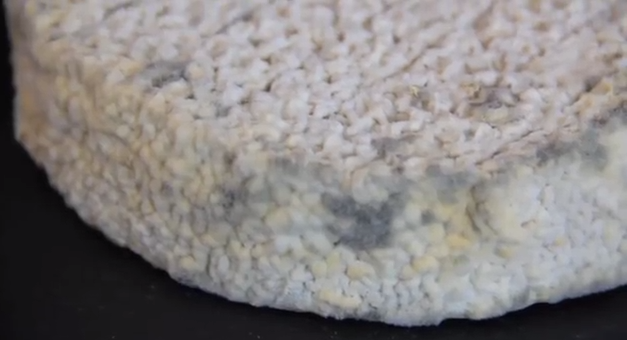Cheese Made From Skin Microbes Might Be The Only Cheese I’d Ever Turn Down

(YouTube)
As many of our regular readers may have gleaned from past posts, we here at Consumerist HQ are pretty big fans of cheese. Grill it in a sandwich, melt it atop a pile of hamburgers, sleep with it under a pillow — basically any way you want to enjoy any kind of cheese is A-OK with us. But scientists using microbes from skin to make cheese might’ve passed a line we cannot step across.
We’re all in favor of DIY dairy, but this project from a scientist at the University of California, Los Angeles and an artist is a bit much: Using donated microbes (including some from The Omnivore’s Dilemma author Michael Pollan), the microbiologist created cheese, reports The Salt blog.
The usual cheese process takes milk and spoils it with Lactobacillus bacteria. The bacteria turn the milk sugars into acid. It then clumps or curdles the milk and the chunks are separated out and aged with yeast to make cheese.
You can get yeast and Lactobacillus anywhere, so why not snag some from our own bodies and use them to curdle milk? My stomach feels curdled already just at the thought, but let’s move on.
The microbiologist swabbed her mouth and skin, Pollan’s belly button, her partner’s tears and another scientist’s feet, then grew the bacteria and yeast in a lab. Once she had enough, she just added fresh milk and produced cheese.
The point isn’t to gross people out, says the microbiologist in charge, it’s just to challenge people to think about how we react to odors and how that might color our impression of cheese and food.
“The idea was to recognize, how do we get grossed out? Then to think about it and move beyond that initial idea of disgust,” she explains. “Why are we more uncomfortable with bacteria on the body than we are with bacteria in cheese?”
If you want to check out the cheese, it’s currently on display at the Science Gallery, at Trinity College in Dublin. You can’t eat the displays, but you’re welcome to take a big whiff.
“People were really nervous and uncomfortable and kind of making these grossed out faces,” the scientist says of her exhibit. “Then they smell the cheese, and they’ll realize that it just smells like a normal cheese.”
I’m starting to look at this in an entirely different light. We are all basically walking and talking cheese factories. I had no idea.
An Omnivore’s Dilemma: Would You Eat Michael Pollan Microbe Cheese? [The Salt]
Want more consumer news? Visit our parent organization, Consumer Reports, for the latest on scams, recalls, and other consumer issues.

